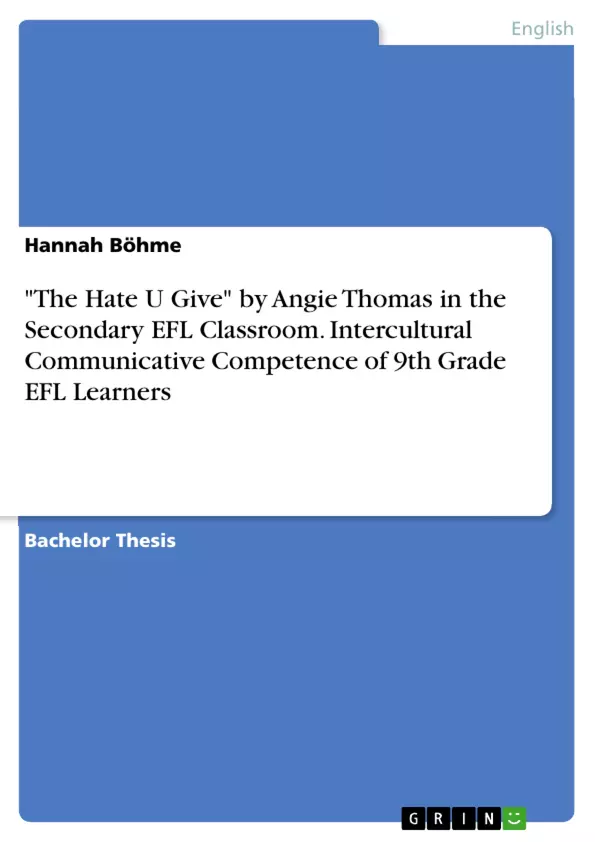The aim of this bachelor's thesis is to investigate how the use of literature as a medium can help implement cultural learning in English as a Foreign Language (EFL) classes. Thus, the present work addresses the benefits and challenges of using Angie Thomas' novel "The Hate U Give" to foster intercultural communicative competence (ICC) in 9th grade EFL students.
The Black Lives Matter (BLM) movement received a considerable amount of support after the death of George Floyd in 2020. All over the world, people took to the streets to protest against racism and police brutality. Also in Germany, people of all ages took part. This movement shows that young people are interested in the issue and want to learn more about it. Accordingly, this can be seen as a reason to educate them, because in a world that seems to become more and more polarised, the ability to think critically is more important and indispensable than ever.
To answer the research question, the second chapter will describe cultural learning. In addition, it takes a closer look at ICC according to the Common European Framework of Reference for Languages (CEFR), briefly outlines Byram's ICC model, which forms the basis for my lesson plan, as well as the principles for inter- and transcultural learning, and the concept of Global Citizenship Education. Moreover, by introducing a cross-curricular model called Confronting Prejudice Responses (CPR) model, which is a strategy to confront prejudice that has proven to be an effective means of reducing prejudice and therefore, it will be applied to the EFL classroom. After explaining these theories relevant to cultural learning, this paper will relate them to literature by presenting the benefits and challenges of literature for intercultural and transcultural learning and will further introduce types of tasks to promote intercultural competence through literature.
After this, the third chapter clarifies the analysis of the potential for inter- and transcultural learning with the young adult novel "The Hate U Give" (2017) by Angie Thomas. Following this, by referring to the core curriculum for secondary level 1 in North Rhine-Westphalia, the learning objectives for using Angie Thomas’ novel in 9th grade will be outlined along with a description of my lesson plan.
Finally, a discussion with a reflection in chapter four is explained, followed by a conclusion in chapter five, which gives a brief summary and critique of the findings.
Inhaltsverzeichnis (Table of Contents)
- 1 Introduction
- 2 Theoretical framework
- 2.1 Cultural learning
- 2.1.1 Intercultural Communicative Competence according to the CEFR vision
- 2.1.2 Intercultural Communicative Competence by Byram
- 2.1.3 Principles for inter- and transcultural learning
- 2.1.4 Global Citizenship Education
- 2.2 The CPR model: Decisions involved in confronting prejudiced responses
- 2.3 Teaching culture using literature
- 2.3.1 Potentials and challenges of literature for inter- and transcultural learning
- 2.3.2 PWP model of lesson planning
- 2.3.3 Task types for promoting intercultural competence through literature
- 3 Analysis
- 3.1 Analysing the potential for inter/-transcultural learning with the young adult novel by Angie Thomas
- 3.2 Learning objectives for the 9th grade
- 3.3 Lesson plan
- 4.0 Discussion
- 5.0 Conclusion
Zielsetzung und Themenschwerpunkte (Objectives and Key Themes)
The aim of this bachelor's thesis is to investigate how the use of literature as a medium can help implement cultural learning in English as a Foreign Language (EFL) classes. Specifically, the thesis examines the benefits and challenges of using Angie Thomas' novel The Hate U Give to foster intercultural communicative competence (ICC) in 9th grade EFL students.
- Intercultural Communicative Competence (ICC)
- Cultural Learning in EFL
- The role of literature in promoting intercultural understanding
- Application of the Confronting Prejudice Responses (CPR) model in the EFL classroom
- Global Citizenship Education
Zusammenfassung der Kapitel (Chapter Summaries)
Chapter 2 delves into the theoretical framework surrounding cultural learning. It explores the concept of ICC in detail, examining its significance within the Common European Framework of Reference for Languages (CEFR) and Byram's ICC model. Additionally, the chapter explores principles for inter- and transcultural learning and the concept of Global Citizenship Education. The chapter also introduces the Confronting Prejudice Responses (CPR) model, a strategy designed to confront prejudice in the EFL classroom.
Chapter 3 analyzes the potential for inter- and transcultural learning offered by the young adult novel The Hate U Give. It outlines the learning objectives for using the novel in 9th grade EFL classes, further detailing a lesson plan based on the novel.
Chapter 4 delves into the discussion of the research findings and provides a reflection on the potential of literature in fostering intercultural competence. Chapter 5 presents a brief summary and critique of the findings.
Schlüsselwörter (Keywords)
The main keywords and focus topics of the text include: intercultural communicative competence, cultural learning, English as a Foreign Language, young adult literature, Angie Thomas' The Hate U Give, the Confronting Prejudice Responses (CPR) model, Global Citizenship Education, inter- and transcultural learning, lesson planning, and critical thinking.
- Quote paper
- Hannah Böhme (Author), 2023, "The Hate U Give" by Angie Thomas in the Secondary EFL Classroom. Intercultural Communicative Competence of 9th Grade EFL Learners, Munich, GRIN Verlag, https://www.grin.com/document/1422201



